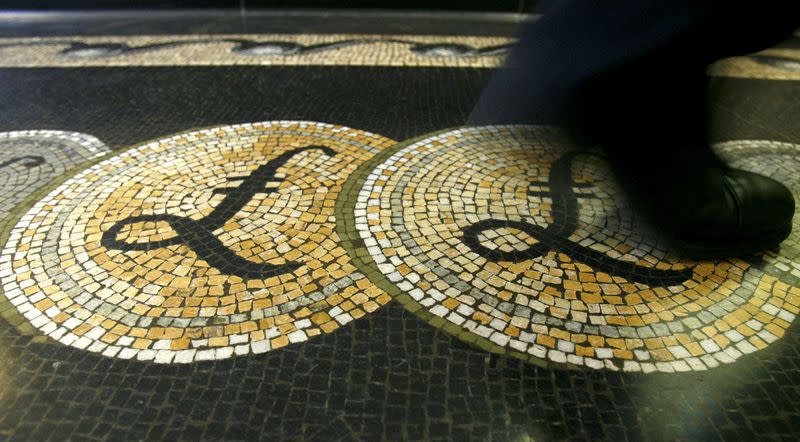Sterling hits 3-month high after U.S. wholesale inflation dents dollar

By Amanda Cooper
LONDON (Reuters -The pound hit three-month highs against the dollar on Tuesday, after last month's U.S. producer inflation rose less than expected, although there was a degree of caution among sterling investors ahead of the UK government's budget this week.
The rise in U.S. prices at the farm and factory gate was much milder than forecast in October, adding to the relief among investors after last week's consumer data that inflation may well have peaked, thereby giving the Federal Reserve scope to slow down its monetary policy tightening.
The data knocked the dollar down by as much as 2.3% against the pound, which touched its highest since Aug. 19.
A cooler read of U.S. consumer inflation last week has prompted investors to factor in the possibility of U.S. interest rates rising more slowly, which in turn, reduces the dollar's appeal to yield-hungry overseas buyers.
"Today is more about the high-beta currencies against the dollar making hay while the sun shines," CIBC Capital Markets head of G10 currency strategy Jeremy Stretch said.
New UK finance minister Jeremy Hunt delivers his autumn budget on Thursday, which is expected to contain a raft of measures, including tax rises and spending cuts, aimed at closing a 50-billion pound ($59 billion) gap in Britain's finances.
Hunt, together with Prime Minister Rishi Sunak, has been keen to assure markets of the government's fiscal prudence and will be keen to avoid the torrent of volatility that his predecessor, Liz Truss, unleashed with her fiscal plan in late September.
The pound was last up 1.2% against the dollar at $1.1902, having reached a session high earlier of $1.2027, while against the euro sterling rose 0.7% to 87.26 pence.
"We do have the fiscal statement coming and that is going to be a sea of negativity," Stretch said.
"Having said that, with the degree of policy tightening, the debate is going to be how much of it is going to be coming in the next year or two and how much is going to be pushed towards the next parliament rather than this one."
Sterling, which has lost some 12% in value against the dollar this year, has risen 3% so far in November, on course for its largest monthly gain since July 2020, when the economy began to reopen after a first round of pandemic lockdowns.
Futures markets show investors are attaching less than a 60% chance of the Bank of England, headed by Governor Andrew Bailey, raising interest rates by 50 basis points in December, and a near 42% chance of a 75-bp increase.
Data on Tuesday showed Britain's unemployment rate rose to 3.6% in the three months to September and vacancies fell for a fifth time in a row as employers worried about the outlook for the economy, the Office for National Statistics said on Tuesday.
Economists polled by Reuters had expected the jobless rate to remain at 3.5%.
Meanwhile, average weekly earnings excluding bonuses rose by 5.7% in the three months to September, above expectations for an increase of 5.5% and their fastest pace since the three months to August 2021.
However, with data on Wednesday expected to show consumer prices rose by 10.7% in October, wages are a long way off keeping pace with inflation - another factor dragging on UK economic growth.
"(Hunt's) statement is likely to be overshadowed by the CPI data, and should any change in GBP be witnessed, it will likely be a decline, as the Chancellor forces the hesitant Bailey into a lower rate hike in December as the budget piles downward pressure on growth," CaxtonFX strategist Michael Brown said.
($1 = 0.8428 pounds)
(Reporting by Amanda CooperEditing by Mark Potter and Tomasz Janowski)

 Yahoo Finance
Yahoo Finance 